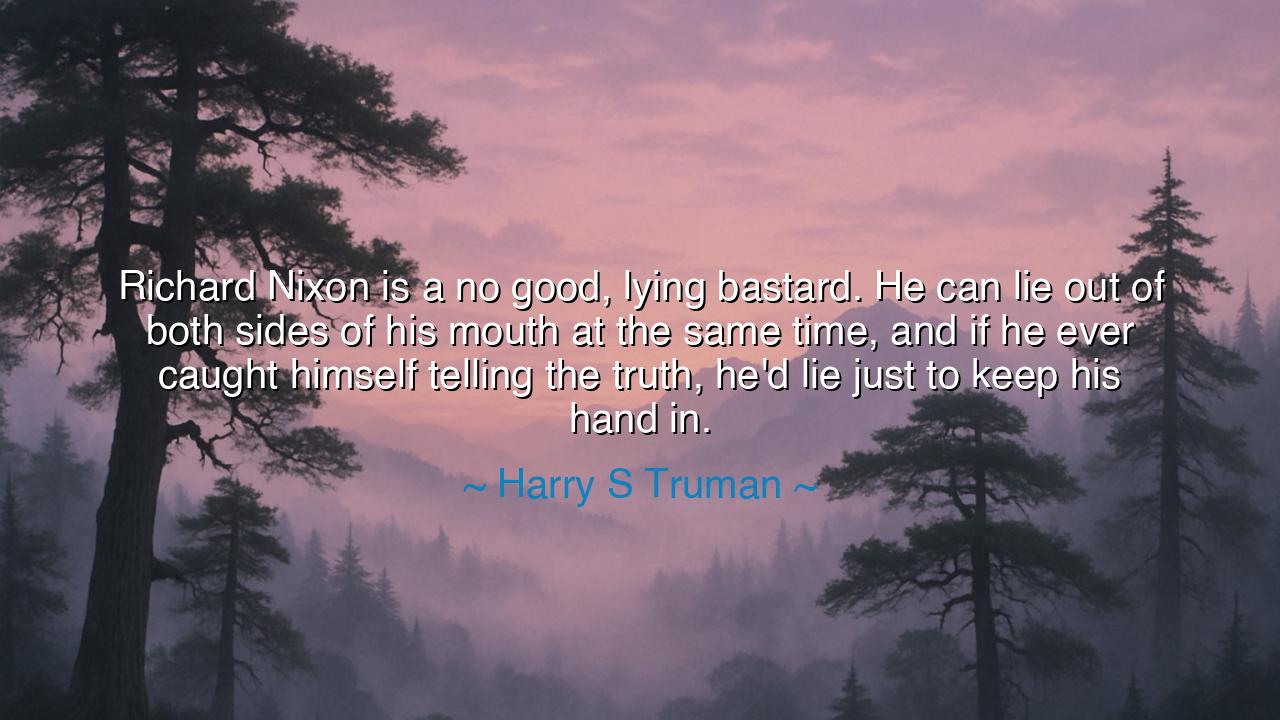
Richard Nixon is a no good, lying bastard. He can lie out of
Richard Nixon is a no good, lying bastard. He can lie out of both sides of his mouth at the same time, and if he ever caught himself telling the truth, he'd lie just to keep his hand in.






In the days of the republic, when the fate of nations was woven in smoke-filled rooms and shouted across the halls of power, there arose a man of blunt tongue and unshaken spirit, Harry S. Truman. From his lips poured forth a judgment sharp as a sword: “Richard Nixon is a no good, lying bastard. He can lie out of both sides of his mouth at the same time, and if he ever caught himself telling the truth, he'd lie just to keep his hand in.” These words, fierce and cutting, stand as more than a curse upon one man. They are a warning, a mirror held up to the face of deceit, and a testament to the ancient struggle between truth and falsehood.
Consider the age in which Truman spoke. Richard Nixon, long before the unraveling of Watergate, had already earned a reputation for cunning, for the cold practice of politics where the end seemed always to justify the means. Truman, himself forged in the fires of war and the burdens of the presidency, despised not merely dishonesty, but the deliberate mastery of it—a man who lies not by accident but by craft, not from weakness but from habit. To Truman, Nixon embodied the danger of such a soul: one who makes of lies a trade, who wears them as armor, who bends reality itself until truth loses its light.
And yet, O listener, these words are not bound only to the quarrel of two statesmen. They echo the warnings of ages past. For did not the philosopher Plato, in his dialogues, speak of the “noble lie,” and did not others twist this into license for manipulation? Did not the Roman orators caution against the silver tongues that could sway the senate with honeyed words while hiding the poison of ambition? In every age, men and women have faced the peril of leaders who make deception a habit, until the lie becomes more natural than breath itself.
Reflect on the story of Marcus Brutus, who cloaked betrayal in the garb of patriotism. When Caesar fell, Brutus cried out that he struck not from malice, but for the good of Rome. Yet history has weighed his act in shadow and sorrow, for Rome itself drowned in blood thereafter. In like manner, Truman’s rebuke of Nixon was a cry against such duplicity, a declaration that deceit, however skillful, corrodes the very foundations of trust. A leader who builds his throne upon lies builds it upon sand, and when the storm comes, it shall surely fall.
But let us not speak only of condemnation; let us wrest wisdom from this fire. The ancients knew that lies are a chain not only to the deceived but also to the deceiver. For he who practices falsehood becomes enslaved to his own web, needing ever more lies to sustain the first. What began as convenience becomes compulsion. This is what Truman saw: a man so entangled in deceit that even truth itself must be bent, lest his hand forget its craft. Such a path is not cunning, but ruin.
Therefore, let the lesson be clear: honesty is not merely virtue, it is strength. Lies may win a day, but truth builds a legacy. To the youth and to the weary alike, I say—speak truth, even when it costs you comfort. Hold fast to integrity, for it is the bedrock upon which trust is forged. Learn to discern the voices of those who speak with double tongues, for they will promise the heavens while leading you to the pit.
In practice, guard your words as you would guard your soul. If you are tempted to twist truth for gain, remember that every falsehood sows seeds that one day will sprout thorns. If you are confronted with deceit in others, do not be seduced by its smoothness; demand deeds that match words. For in families, in friendships, in the councils of nations, it is better to stand with a harsh truth than to kneel before a sweet lie.
So hear me, children of the future: the voice of Truman was not the bitterness of a single man but the echo of the eternal struggle between truth and deception. Let his sharp rebuke ring in your memory, and let it stir you to be men and women of unshakable word. For empires may fall, and leaders may falter, but the truth endures like stone beneath the river of time.






AAdministratorAdministrator
Welcome, honored guests. Please leave a comment, we will respond soon